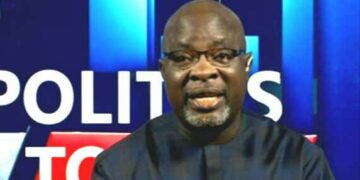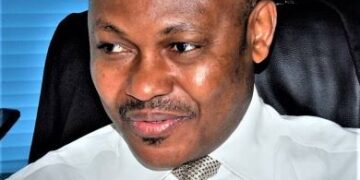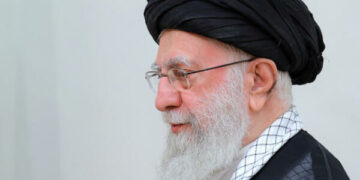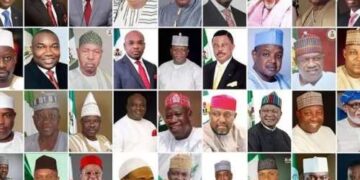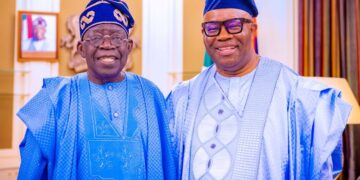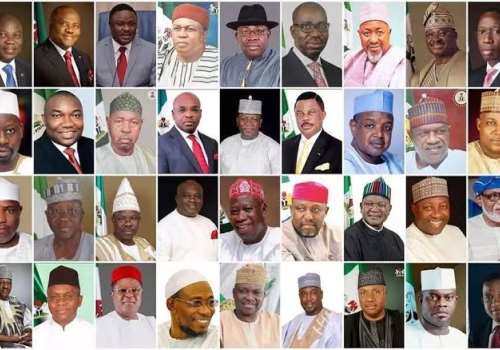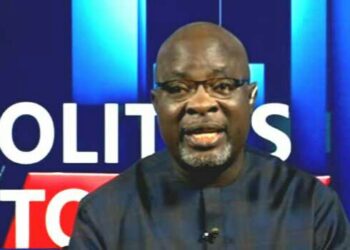“Leadership is character in motion.” Les Csorba, (Trust the one thing that makes or breaks a leader).
The best beginning for this piece is to borrow some very powerful and profoundly philosophical citations from the work of the American author by the name of Les T. Csorba who did profound justice to the thematic area of trust and political leaders. His focus was on the United States of America, but what he highlighted have universal application.
These character flaws adumbrated in this colourful book are synonymous with the ostentatious and corruption laden lifestyles of a greater percentage of political office holders in the current political dispensation of President Bola Ahmed Tinubu.
From the Presidency right down to the governors, the stark lack of effective delivery of beneficial services and enduring infrastructures coupled with the weak resolve by these political leaders to even build up the capacity of the citizens to become their best selves, is attributed to the widespread practices of corruption and bad governance. It is as if the present day politicians were the ones depicted by the great author Professor Chinua Achebe in one of his books ‘The Man of the People ” and also replicated in his other smaller book entitled “The Trouble with Nigeria”. Professor Achebe just like Nostradamus saw tomorrow or our today.
Les T.Csorba wrote as follows: “The failure of today’s leaders is vividly illustrated in Pieter Bruegel’s tragic image of the blind leading the blind.
The sixteenth-century picture is a haunting reminder of the consequences of failed leadership. To blindly follow blind leaders or to lead blindly is treacherous. We stumble and then fall. Bruises and broken bones are our lot. In this heartbreaking image, Bruegel gives visual expression to Jesus’ words about people’s inner blindness to authentic faith: “Can the blind lead the blind? Shall they not both fall into the ditch?” (Luke 6:39 KJV).
He continued by stating that the six men in Bruegel’s painting are described in Gert Hoffman’s novel, The Parable of the Blind, as self-absorbed, withdrawn, bitter, and distrustful. They cannot see that they are blundering, weak, and hopeless. They begin to stumble around, bumping into each other. The leader collapses abruptly, and the second, following close behind, begins to brace. The next two men are headed for the same fate, and appear to clutch on more tightly as they sense something terrible happening.
The remaining two are more relaxed, utterly unaware of what lies ahead of them. And this is where it hits you: This is the leadership that dominates our modern institutions today, particularly major corporations. It is what we might call the “lemming effect,” where the lemmings-the small furry-footed rodents known for recurrent mass migrations into the Norwegian sea-would follow each other to their death by submersion.
With Enron leading the way, other energy giants like Dynegy, Williams, and Reliant begin to change their business model by expanding into other non-core businesses like communications, merchant energy trading, and broadband, and almost drowning themselves in the ditch.
The author told us that just as Jesus’ parable is not about physical blindness, this leadership parable is not about physical weaknesses, but about our moral frailties.
This profoundly knowledgeable book, which is our source of the aforementioned citations, is entitled: “Trust, THE ONE THING THAT MAKES OR BREAKS A LEADER” by Mr.
Les T. Csorba who was a FORMER WHITE HOUSE ADVISOR FOR PRESIDENTIAL PERSONNEL AND NOW PARTNER WITH THE WORLD’S PREMIER EXECUTIVE SEARCH FIRM.
The issue of gaining the trust and confidence of the citizens is very strategic for political office holders because those are the essential elements that guarantee good governance that delivers quality services to the citizens.
In Nigeria, since the beginning of politics in 1963, after Nigeria became a Republic, politics and politicians have become synonymous with distrust because during campaigns, those seeking elective offices make pronouncements of initiatives they want to implement but the implementation has never been truthful and realistic. When Yakubu Gowon was in power as a military dictator in the early seventies when crude oil money started pouring into our public coffers, he was quoted as saying that Nigeria has too much money so much so that we don’t know what to do with the money”. Well, the military despots and civilians that have led Nigeria at different epoch, took their time to line their pockets with public funds or filthy lucre to the collective detriment of the citizens who have unfortunately become too poor, malnourished, sick and weak.
The transparency and accountability deficits in the political leadership of Nigeria, especially in today’s government, have led to massive trust deficits and lack of public confidence in the ability of politicians to put their money where their mouth is.
The infusion of bribery of voters by political aspirants and the failure on the part of the followership to denounce bribes-for-votes and stick to their conscience have largely made politicians to actually see politics as trade by barter: they pay bribes to voters, pay bribes to the leadership of the election management body and also bribe the judges from the election tribunal right up to the Supreme Court of Nigeria so as to receive validation for their crooked electoral victory. These tragic trio of bribe giving and bribe taking marked the last general election. This is why the economic crisis facing the masses have become troubling which were exactly predicted by Professor Chinua Achebe in his book The Trouble with Nigeria.
In the following excerps from an analysis of the book by Chinua Achebe titled The Trouble with Nigeria|Chinua Achebe as analysed by Shayera Dark, can be of so much help in our endeavour to understand where the rain started to beat us in Nigeria.
His words: “Thirty-five years after Chinua Achebe published his essay The Trouble with Nigeria, Nigeria continues to grapple with the same nine problems he enumerated. Following independence in 1960, neither its civilian nor military governments have shown a remarkable aptitude for managing state affairs, and it is this rudderless leadership that Achebe points to as the crux of Nigeria’s headache.
“The trouble with Nigeria is simply and squarely a failure of leadership,” reads the first sentence in The Trouble with Nigeria. “There’s nothing basically wrong with the Nigerian character. The Nigerian problem is the unwillingness or inability of its leaders to rise to the responsibility, to the challenge of personal example, which are the hallmarks of true leadership,” he adds.
Achebe finds the political ideologies of Nigeria’s founding fathers rooted in “pious materialistic wooliness and self-centred pedestrianism” and bankrupt of the intellectual rigour exhibited in the writings of other African nationalists like Ghana’s Nkrumah and Tanzania’s Nyerere. Of the nation’s first president, Nnamdi Azikiwe and prime minister Obafemi Awolowo, he suggests their fixation on personal ambition and wealth rather than selfless leadership predisposed the newly independent Nigeria to “disorderly growth and mental deficiency.”
In another chapter, Achebe argues Azikiwe’s desire to lead at all cost played a role in crippling nationalism and promoting mediocrity and tribalism, two plagues that ravish Nigeria to date. Upon losing the Western House of Assembly to Awolowo in 1951, Azikiwe returned to eastern Nigeria—his ancestral turf—in search of power and tribal support, shunning the national aspirations he so professed and would have embodied had he stayed on as leader of the opposition.
With his political clout and newspapers, Azikiwe launched a campaign that ousted Eyo Ita, the leader of Government Business in Enugu, then moved to fill his cabinet with incompetents. Achebe notes the political manoeuvre not only fed into pre-existing suspicions of Igbo domination among minority tribes, to which Ita belonged, but signalled one of the first instances of mediocre leadership that has come to characterise Nigerian politics.
But reactionary tribal politics would not stop there. After the civil war ended in 1970, as Federal Commissioner for Finance, Awolowo implemented the punitive banking policy that left Igbos with 20 pounds regardless of what they owned as retribution for seceding from Nigeria.
Awolowo’s supervision of the legal defrauding of Nigerians, as well as Azikiwe’s politically expedient tribalism, leads Achebe to question their continued veneration, especially since unity, a concept the writer describes as impeachable for its dependence on the actor’s motives, is seemingly the bedrock of Nigeria’s democracy. Every general and president has been quick to proclaim Nigeria’s unity is non-negotiable, but questions abound over the insidious ways the government has strengthened tribal affiliations over nationalism through questionable political appointments, resource allocations and job placements in the name of affirmative action.
Corruption and the lack of patriotism are also mentioned as impediments to Nigeria’s progress. On the former, Achebe criticises the political class for syphoning public funds through inflated contracts and the payment of salaries to non-existent workers to the tune of 600 million naira a year, a sum he claims could have built three refineries or two new international airports.
Coming to the case of lack of trust on politicians, let us take a quick review of what Bola Ahmed Tinubu promised Nigerians during the campaign and then we compare these promises with the expanding frontiers of hunger, anger and poverty tearing apart millions of families to the extent that there are over 133 million multidimensional poor households in Nigeria.
Manifesto: Tinubu’s 10 promises to Nigerians
The All Progressives Congress presidential candidate, during the campaign released an 80-page policy document that highlights an eight-point agenda.
It was observed that top on his priority lists of action plans was national security, economy, agriculture, power, oil and gas, transportation and education.
In the manifesto the then presidential candidate Tinubu said his objective is to foster a new society based on shared prosperity, tolerance, compassion, and the unwavering commitment to treating each citizen with equal respect and due regard.
Here are 10 promises of the former Lagos State governor contained in the manifesto.
1. Build a Nigeria, especially for our youth, where sufficient jobs with decent wages create a better life.
2. Manufacture, create, and invent more of the goods and services we require. Nigeria shall be known as a nation of creators, not just of consumers.
3. Export more and import less, strengthening both the naira and our way of life.
4. Continue assisting our ever-toiling farmers, through enlightened agricultural policy that promotes productivity and assures decent incomes, so that farmers can support their families and feed the nation.
5. Modernise and expand public infrastructure so that the rest of the economy can grow at an optimal rate.
6. Embolden and support our young people and women by harnessing emerging sectors such as the digital economy, entertainment and culture, tourism and others to build the Nigeria of tomorrow, today.
7. Train and give economic opportunity to the poorest and most vulnerable among us. We seek a Nigeria where no parent is compelled to send a child to bed hungry, worried whether tomorrow shall bring food.
8. Generate, transmit and distribute sufficient, affordable electricity to give our people the requisite power to enlighten their lives, their homes, and their very dreams.
9. Make basic healthcare, education, and housing accessible and affordable for all.
10. And, most importantly, establish a bold and assertive policy that will create a strong yet adaptive national security architecture and action to obliterate terror, kidnapping, banditry, and all other forms of violent extremism from the face of our nation.
(source: punchng). There are empirical evidence to prove that insecurity has escalated, with over 6,000 citizens killed by terrorists, crime rates have ballooned out of control just as the costs of living crises have become worse due to the bad economic policies of Tinubu such as hikes in fuel prices and the devaluation of the Naira. Corruption is widespread even as nepotism has become the centrepiece of Tinubu modus Operandi. Tinubu made his Yoruba kinsmen and women as heads of all strategic and military instruments. He has made the Country much more divided.
Can I now point out to President Tinubu what John Lock stated about how to organise and lead well as the president of a complex country of over 200 ethnic nationalities.
John Locke (1632–1704) is among the most influential political philosophers of the modern period. In the Two Treatises of Government, he defended the claim that men are by nature free and equal against claims that God had made all people naturally subject to a monarch. He argued that people have rights, such as the right to life, liberty, and property, that have a foundation independent of the laws of any particular society.
Locke used the claim that men are naturally free and equal as part of the justification for understanding legitimate political government as the result of a social contract where people in the state of nature conditionally transfer some of their rights to the government in order to better ensure the stable, comfortable enjoyment of their lives, liberty, and property.
Since governments exist by the consent of the people in order to protect the rights of the people and promote the public good, governments that fail to do so can be resisted and replaced with new governments. Locke is thus also important for his defense of the right of revolution. Locke also defends the principle of majority rule and the separation of legislative and executive powers.
In the Letter Concerning Toleration, Locke denied that coercion should be used to bring people to (what the ruler believes is) the true religion and also denied that churches should have any coercive power over their members. Locke elaborated on these themes in his later political writings, such as the Second Letter on Toleration and Third Letter on Toleration. (source: plato.stanford.edu).
Politics, politicians must work selflessly, institutionalise the principles of transparency and accountability so as to banish the widening spectre of trust deficits that they have amongst the citizens of Nigeria. Only by letting institutions of democracy to work and rooting out corruption of all genres, can Nigeria develop and advance so the people of Nigeria will get to their best selves.


